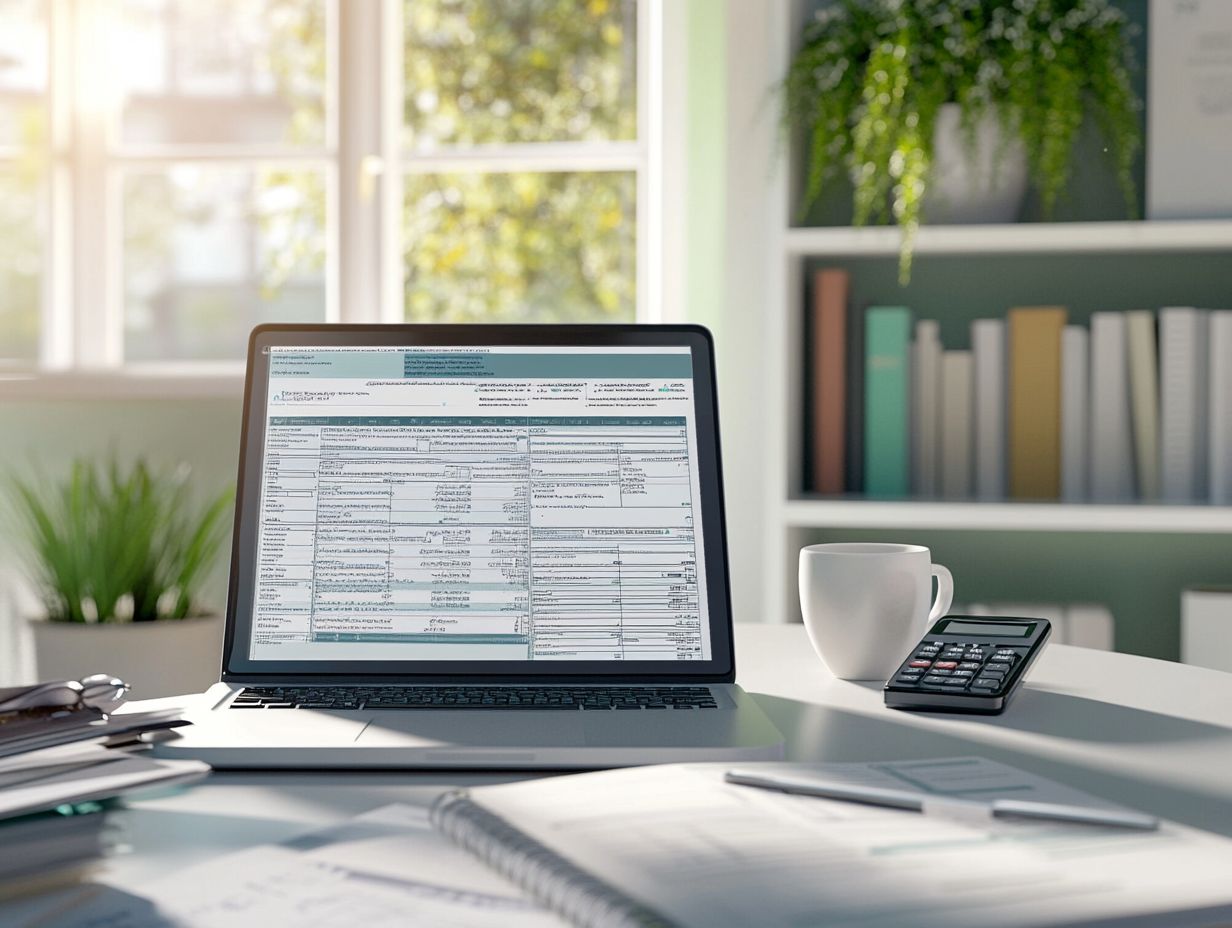Understanding Tax Regulations for Freelance Work
Freelancing provides you with unparalleled flexibility and independence, yet it carries distinct freelance taxes that you must navigate.
Knowing your tax responsibilities is vital for your success! This guide delves into the various types of business taxes you encounter as a freelancer, highlights critical deadlines, and reveals how to leverage tax deductions and credits to reduce your tax burden effectively.
It s important to maintain organized records. Collaborating with a tax professional can empower you to manage the financial landscape of freelance work with confidence and clarity.
Contents
- Key Takeaways:
- Understanding Tax Obligations for Freelancers
- Maximizing Deductions and Credits for Freelancers
- Keeping Records and Staying Organized
- Working with a Tax Professional
- Frequently Asked Questions
- What are tax regulations for freelance work?
- Do I have to pay taxes as a freelancer?
- What is self-employment tax and how does it apply to freelancers?
- Are there any deductions or credits available for freelancers?
- Do I need to make estimated tax payments as a freelancer?
- What happens if I don’t comply with tax regulations for freelance work?
Key Takeaways:

- Understand the different types of taxes and deadlines for filing as a freelancer to avoid penalties and maximize deductions and credits.
- Keep good records. They make tax preparation easier and more accurate.
- Consider hiring a tax professional to ensure compliance with complex tax regulations and take advantage of their expertise in maximizing tax savings for freelance work.
What is Freelance Work?
Freelance work encompasses self-employed individuals who provide their services on a project or contract basis, setting themselves apart from traditional employment. This flexible arrangement gives you the power to explore various fields such as writing, graphic design, and programming, often allowing you to juggle multiple clients at once.
In today’s gig economy, many are venturing into freelance opportunities to gain autonomy and diversify their income streams. As a freelancer, you can delve into diverse domains like digital marketing, photography, and web development, each offering its own set of rewards and challenges.
While the appeal of being your own boss and enjoying flexible hours is undeniable, you may also encounter the realities of inconsistent income and the need for self-discipline in managing your workload.
Building strong client relationships is paramount. You can achieve this by maintaining clear communication, meeting deadlines, and demonstrating reliability. By actively engaging with clients and truly understanding their needs, you enhance your reputation and lay the groundwork for repeat business and valuable referrals.
Why are Taxes Important for Freelancers?
Understanding your tax obligations is crucial as a freelancer. You’re responsible for your own income taxes and self-employment tax a tax you pay because you work for yourself which includes contributions to Social Security and Medicare.
Unlike traditional employees who have taxes conveniently withheld from their paychecks, you need to take the initiative to estimate your tax liabilities and make quarterly tax payments to the IRS. This proactive approach helps you avoid penalties and ensures compliance with tax laws, particularly when it comes to filing your tax return. For specific advice, check out these tax tips for freelancers in the gig economy.
Proper tax planning becomes essential when managing the diverse income streams and fluctuating earnings that come with freelance work. For guidance on this, consider understanding freelance income reporting. Ignoring tax regulations can lead to hefty fines, increased scrutiny from the IRS, and the looming threat of audits.
In this complex landscape, tax professionals are invaluable, offering crucial tax professionals’ advice to freelancers navigating their unique tax responsibilities. They help you understand the unique deductions available in your industry, manage your records efficiently, and stay updated on any legislative changes.
By leveraging the knowledge of these experts, you can make informed decisions that optimize your tax situation and ultimately enhance your financial stability.
Understanding Tax Obligations for Freelancers
As a freelancer, your tax obligations are distinct from those of traditional employees, primarily due to the nuances of income reporting and the necessity of filing a tax return with documents like 1099 forms. These forms report your income to the IRS.
Being self-employed means you need to meticulously track your freelance income and file estimated taxes quarterly, ensuring you fulfill your financial responsibilities to the IRS. Grasping these obligations is crucial; it helps you avoid unnecessary penalties and can maximize your potential tax refunds. For more insights, check out our guide on navigating quarterly taxes as a freelancer.
Different Types of Taxes for Freelancers
Freelancers face various taxes, including self-employment tax, which covers contributions to Social Security and Medicare. Income taxes are based on freelance earnings. To report your income and expenses accurately, you’ll typically need to file a Schedule C, a form used to report income and expenses from freelancing, with your tax return. This allows you to detail your business income and any deductible expenses.
This approach streamlines the process and ensures you capture all eligible deductions that can significantly lower your taxable income. Unlike traditional employees, who have taxes withheld from their paychecks, you must proactively manage your tax obligations throughout the year. This includes making estimated quarterly tax payments and following 5 essential tax tips for creative freelancers to avoid penalties, especially since your income can fluctuate widely.
Understanding FICA comprising both Social Security and Medicare taxes is crucial for planning your retirement. By familiarizing yourself with these details, you enhance your financial planning and ensure compliance with tax regulations. Additionally, if you’re a freelancer, knowing how to save for taxes can protect you against potential tax audits.
Deadlines and Filing Requirements

As a freelancer, you must adhere to specific deadlines and filing requirements during tax season to follow IRS rules. One critical date to keep in mind is April 15, the deadline for filing your individual tax returns, including freelance income. You’re also required to make quarterly tax payments to avoid penalties, making it essential to stay organized throughout the year.
In addition to April 15, be sure to mark your calendar for June 15, September 15, and January 15 of the following year these are when your quarterly estimated tax payments are due.
To navigate the tax-filing process efficiently, maintain accurate records of your freelance income and business expenses using digital tools like accounting software designed specifically for freelancers. It’s wise to set aside a percentage of each payment you receive throughout the year, ensuring that payments feel less daunting when deadlines approach. For more insights, check out the importance of keeping tax records for freelancers.
Engaging with a tax professional who understands the unique challenges freelancers face can provide invaluable insights. They can help you get the most out of your tax deductions as a freelancer and minimize tax liabilities.
Maximizing Deductions and Credits for Freelancers
Maximizing tax deductions and credits is crucial for freelancers to cut their taxable income and boost their finances.
You have the opportunity to claim a range of tax deductions, including common business expenses like home office costs, equipment purchases, and software subscriptions.
By familiarizing yourself with the various self-employed deductions available, you can significantly lower your tax liabilities and keep more of your hard-earned money.
Common Deductions for Freelancers
As a freelancer, you have access to numerous common deductions that can significantly lower your taxable income. Key deductions to consider include deductible expenses for your home office, costs associated with accounting software, and business expenses incurred while working on freelance projects.
Costs related to supplies and materials necessary for your services can also qualify as deductible expenses, crucial to your business income. For example, if you’re a graphic designer, you can deduct the cost of design software or stock images used for client projects, ensuring your freelance income tax is optimized. Additionally, understanding how to handle tax audits as a freelancer can further safeguard your financial health.
To effectively track these expenses throughout the year, implementing a straightforward accounting system or utilizing dedicated expense-tracking apps can be invaluable. By keeping digital receipts and categorizing expenses as they arise, you maintain organized records. This approach not only makes tax time less stressful but also ensures that you fully capitalize on all available deductions.
Unlock Significant Financial Advantages with Tax Credits!
Tax credits can empower you to reduce your overall tax liabilities as a freelancer. As a self-employed individual, you may qualify for various credits, such as those related to retirement plan contributions and health insurance premiums. These credits can translate into substantial tax refunds.
Understanding taxes might feel overwhelming, but recognizing the available credits is crucial for enhancing your financial well-being. For instance, when you contribute to retirement plans like a Solo 401(k) or SEP IRA, you not only strengthen your future savings but also enjoy immediate tax benefits.
If you purchase health insurance through the Health Insurance Marketplace, the Premium Tax Credit could be a game-changer, particularly in reducing your tax liabilities during tax season. These credits lighten the load during tax season and serve as vital incentives for saving for retirement plans and maintaining health coverage. Ultimately, they craft a more favorable financial landscape for your future.
Keeping Records and Staying Organized
Maintaining precise records and staying organized is essential for you as a freelancer. It ensures compliance with tax regulations and simplifies the filing process.
Effective record keeping means documenting all your income, expenses, and relevant tax documents throughout the year. This practice not only streamlines your income tracking but also enables you to leverage available deductions and credits, maximizing your financial benefits.
Importance of Record Keeping for Taxes

Record keeping is absolutely essential to meet your tax obligations as a freelancer. Accurately reporting your income and expenses to the IRS is crucial.
Well-organized records help ensure that you report your income correctly and provide a robust defense against potential tax audits. They offer solid proof of your business income and expenses.
By keeping structured documentation, you can substantiate every deduction you claim, significantly reducing the risk of discrepancies during audits. This practice simplifies your tax return preparation and fosters a sense of financial discipline, enhancing your cash flow management.
Utilizing bookkeeping tools or software allows you to maintain real-time records and easily categorize your transactions. This meticulous attention to detail empowers you to stay compliant with IRS regulations, protecting you from unnecessary penalties and stress. Additionally, understanding what to know about sales tax as a freelancer is essential. Prioritizing organized financial management highlights the long-term benefits for your freelance business.
Tools and Strategies for Organizing Finances
Using the right tools and strategies for organizing your finances can make a world of difference in managing your tax obligations as a freelancer. With accounting software, you can automate income tracking, categorize expenses, and generate financial reports, streamlining the entire process and minimizing the chances of errors come tax season.
Popular accounting platforms like QuickBooks, FreshBooks, or Wave help you maintain an organized financial landscape. These tools facilitate invoicing and payments and offer valuable analytics that empower you to make informed financial decisions.
To enhance your organization, create specific folders for your receipts and invoices, whether digitally or physically. Implementing a regular schedule for reviewing your finances, perhaps on a monthly basis, allows you to stay ahead of your cash flow, ensuring that nothing slips through the cracks when tax time rolls around.
Working with a Tax Professional
Collaborating with a tax professional can offer you invaluable support as you navigate the complexities of your tax obligations and financial planning.
These experts provide tailored advice that aligns perfectly with your unique needs as a freelancer, ensuring compliance with IRS regulations while helping you maximize deductions and credits.
Their expertise is crucial in preparing you for any potential tax audits, making it a wise investment in your financial well-being.
Start tracking your expenses today to maximize your deductions!
Benefits of Hiring a Tax Professional
Hiring a tax professional offers many benefits for freelancers like you. They provide expert guidance on tax planning strategies and valuable insights on effectively minimizing tax liabilities. These professionals bring a wealth of knowledge and experience that is essential for navigating the complexities of your unique financial landscape.
By collaborating with a knowledgeable specialist, you gain access to personalized advice tailored specifically to your circumstances. This targeted approach saves you valuable time, which you could invest in growing your business, and eases the stress that often accompanies tax season.
With a dedicated expert by your side, you can enjoy the peace of mind that comes from knowing your tax filing intricacies are being managed properly. This freedom lets you dive into what you love most growing your business while ensuring compliance with current tax regulations, ultimately leading to more favorable financial outcomes.
How to Find a Reliable Tax Professional
Finding a reliable tax professional is crucial for you as a freelancer to ensure that your tax obligations are managed effectively. When you’re on the hunt for a tax advisor, consider their credentials, experience with freelancers like yourself, and their willingness to provide personalized service. Referrals from trusted sources can be invaluable in identifying reputable professionals.
Seek out advisors who stay updated on tax laws, which often change and can impact your unique financial situation. Evaluate potential tax professionals by assessing their communication skills, as clear and transparent dialogue is essential for building a productive relationship. Additionally, consider looking into how to estimate your taxes as a freelancer to better understand your obligations.
Social media platforms and professional networks can be excellent resources for discovering tax advisors who specialize in freelance work. Client reviews are particularly important in this selection process, offering insights into a professional’s reliability and effectiveness. For new freelancers, considering tax planning tips can help you feel more confident in your choice.
Frequently Asked Questions

What are tax regulations for freelance work?
Tax regulations for freelance work refer to the laws and rules set by the government for individuals who are self-employed and earn income through freelance or contract work. These regulations determine how much tax a freelancer needs to pay and how they should report their earnings.
Do I have to pay taxes as a freelancer?
Yes, freelancers are required to pay taxes on their income just like any other worker. However, the tax process for freelancers may differ from traditional employees since they are responsible for reporting and paying their own taxes.
What is self-employment tax and how does it apply to freelancers?
Self-employment tax is a special tax for self-employed people. It covers both Social Security and Medicare taxes. Freelancers must pay self-employment tax on their net earnings, which is calculated by subtracting business expenses from their total income.
Are there any deductions or credits available for freelancers?
Yes, there are various deductions and credits available for freelancers to help reduce their tax liability. These may include home office expenses, business-related travel, and health insurance premiums, among others. It is important for freelancers to keep track of their business expenses and consult with a tax professional for advice on deductions and credits.
Do I need to make estimated tax payments as a freelancer?
Yes, freelancers are required to make estimated tax payments throughout the year, typically on a quarterly basis. These payments are used to cover income tax and self-employment tax on their earnings. Failure to make estimated tax payments can result in penalties and interest charges.
What happens if I don’t comply with tax regulations for freelance work?
If a freelancer fails to comply with tax regulations, they may face penalties, interest charges, and even legal action from the government. It is important for freelancers to understand and follow tax regulations to avoid any potential consequences.






